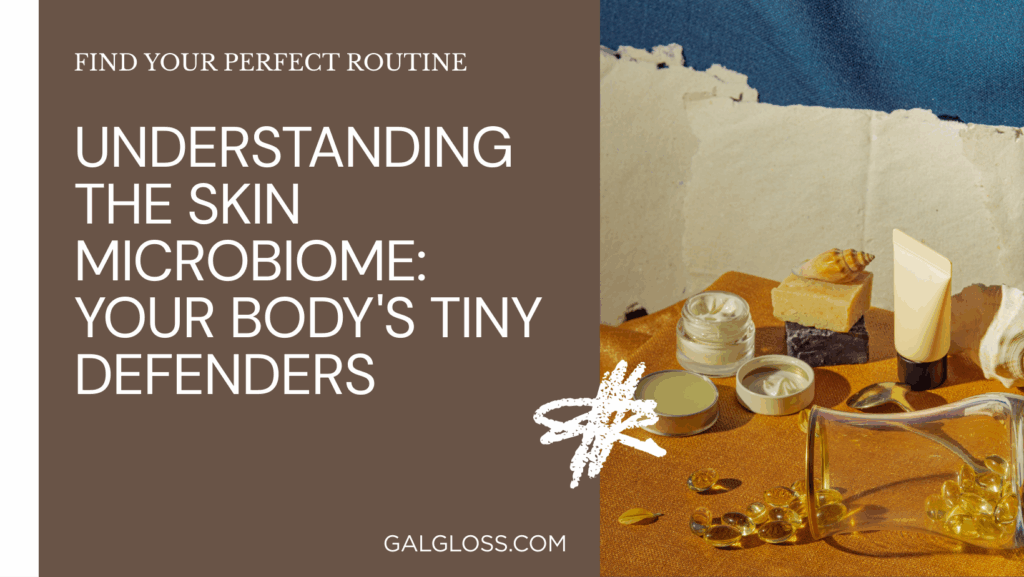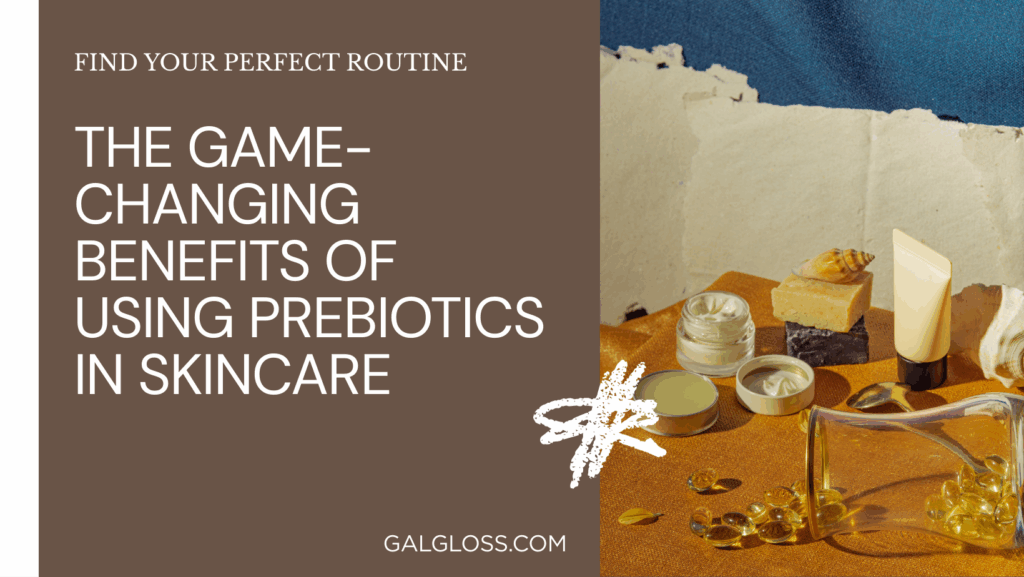Ever wondered why your skin feels like it has a mind of its own? Well, it kind of does! Welcome to the fascinating world of the skin microbiome – your body’s very own microscopic ecosystem.
Think of your skin as a bustling city, teeming with billions of tiny inhabitants. These microorganisms aren’t just freeloaders; they’re hard-working residents that play a crucial role in keeping your skin healthy and happy. But what exactly is this skin microbiome, and why should you care?
Imagine your skin as a vibrant garden. The microbiome is like the soil – it’s the foundation that supports everything else. Just as healthy soil leads to thriving plants, a balanced skin microbiome contributes to glowing, resilient skin. It’s not just about looking good; it’s about feeling good and staying healthy from the outside in.
The Basics of the Skin Microbiome

So, what exactly makes up this invisible world on your skin? Let’s break it down:
- Bacteria: The most abundant residents, including good guys like Staphylococcus epidermidis and Propionibacterium acnes.
- Fungi: Yeast like Malassezia are common inhabitants.
- Viruses: Believe it or not, some viruses on your skin can actually help keep harmful bacteria in check.
These microorganisms aren’t evenly distributed. Your face, for instance, is like Manhattan – densely populated and diverse. Your arms? They’re more like the suburbs – less crowded but still vital to the overall ecosystem.
But how does this microbial community form? It’s a process that starts even before we’re born. As we pass through the birth canal, we get our first dose of microbes. From there, our skin microbiome continues to develop and change throughout our lives, influenced by factors like:
- Age
- Hormones
- Diet
- Environment
- Skincare products
The Skin Microbiome’s Role in Health
Now, you might be thinking, “Why should I care about these tiny critters on my skin?” Well, they’re not just hanging out – they’re working hard to keep you healthy. Here’s how:
Protection Against Pathogens
Your skin microbiome is like a well-trained security team. It:
- Competes with harmful bacteria for resources
- Produces antimicrobial substances
- Helps maintain the skin’s acidic pH, which deters many pathogens
Skin Barrier Function
Think of your skin as a fortress wall. The microbiome helps reinforce this wall by:
- Strengthening the skin’s physical barrier
- Producing lipids that help seal in moisture
- Regulating skin cell turnover
Immune System Modulation
Your skin microbiome is in constant communication with your immune system. It helps:
- Educate immune cells about which microbes are friends or foes
- Reduce inflammation
- Promote wound healing
Factors Affecting the Skin Microbiome
Just like any ecosystem, your skin microbiome can be disrupted. Here are some key factors that can throw things out of balance:
- Age and Hormones: As we age, our skin’s pH changes, affecting which microbes thrive. Hormonal changes during puberty, pregnancy, or menopause can also shake things up.
- Diet and Lifestyle: What you eat doesn’t just affect your gut – it impacts your skin too. A diet high in sugar and processed foods can disrupt your skin’s microbial balance.
- Environmental Factors: UV radiation, pollution, and even changes in temperature and humidity can affect your skin’s microbial residents.
- Skincare Products and Hygiene Practices: Harsh soaps, over-exfoliation, and some antibacterial products can disrupt your skin’s natural balance.
Common Skin Conditions and the Microbiome
When your skin’s ecosystem gets out of whack, it can lead to various skin conditions. Let’s look at a few:
Acne
Contrary to popular belief, acne isn’t just about oily skin and clogged pores. An imbalance in the skin microbiome, particularly an overgrowth of certain P. acnes strains, can contribute to those pesky breakouts.
Eczema
People with eczema often have less microbial diversity on their skin. This can weaken the skin barrier and make it more susceptible to irritation and allergies.
Psoriasis
While the exact cause is unknown, research suggests that changes in the skin microbiome may play a role in psoriasis flare-ups.
Rosacea
An overgrowth of Demodex mites, which are part of the normal skin fauna, has been linked to rosacea symptoms in some people.
Maintaining a Healthy Skin Microbiome
So, how can you keep your skin’s tiny defenders happy and healthy? Here are some tips:
- Gentle Cleansing: Ditch the harsh soaps. Opt for gentle, pH-balanced cleansers that won’t strip your skin of its natural oils and good bacteria.
- Probiotic Skincare: Consider products with prebiotics or probiotics. These can help support a diverse and balanced skin microbiome.
- Diet and Supplements: Eat a varied diet rich in fruits, vegetables, and fermented foods. Some studies suggest that oral probiotics might benefit skin health too.
- Stress Management: High stress levels can disrupt your skin microbiome. Try stress-reduction techniques like meditation or yoga.
- Avoid Over-Cleansing: You don’t need to scrub your skin squeaky clean. A little dirt won’t hurt – it might even help maintain a diverse microbiome!
- Moisturize: Keeping your skin hydrated helps maintain a healthy environment for your microbial friends.
Here’s a quick reference table for microbiome-friendly skincare:
| Do | Don’t |
| Use gentle, pH-balanced cleansers | Over-exfoliate |
| Moisturize regularly | Use harsh, antibacterial soaps |
| Consider probiotic skincare | Sleep with makeup on |
| Protect your skin from UV rays | Touch your face frequently |
| Eat a balanced diet | Smoke or drink excessively |
The Future of Microbiome Research
The field of skin microbiome research is exploding, and the future looks exciting. Here are some areas to watch:
- Personalized Skincare: Imagine getting your skin microbiome analyzed and receiving a custom skincare routine tailored to your unique microbial profile.
- Microbiome-Based Treatments: Researchers are exploring ways to use good bacteria to treat skin conditions. For example, applying specific strains of bacteria might help combat acne or eczema.
- Ongoing Studies: Scientists are continually uncovering new connections between the skin microbiome and overall health. Who knows what they’ll discover next?
Conclusion
Your skin is more than just a protective wrapper – it’s a complex ecosystem teeming with life. Understanding and nurturing your skin microbiome is key to achieving healthy, radiant skin.
Remember:
- Your skin microbiome is unique to you
- It plays a crucial role in skin health and overall well-being
- Many factors can disrupt this delicate balance
- Simple changes in skincare and lifestyle can help maintain a healthy skin microbiome
As we’ve seen, the world of the skin microbiome is fascinating and complex. By taking care of these tiny defenders, you’re not just improving your skin – you’re supporting your overall health.
So next time you look in the mirror, take a moment to appreciate the invisible army working tirelessly to keep your skin healthy. Your skin microbiome may be microscopic, but its impact is anything but small! markdown.





